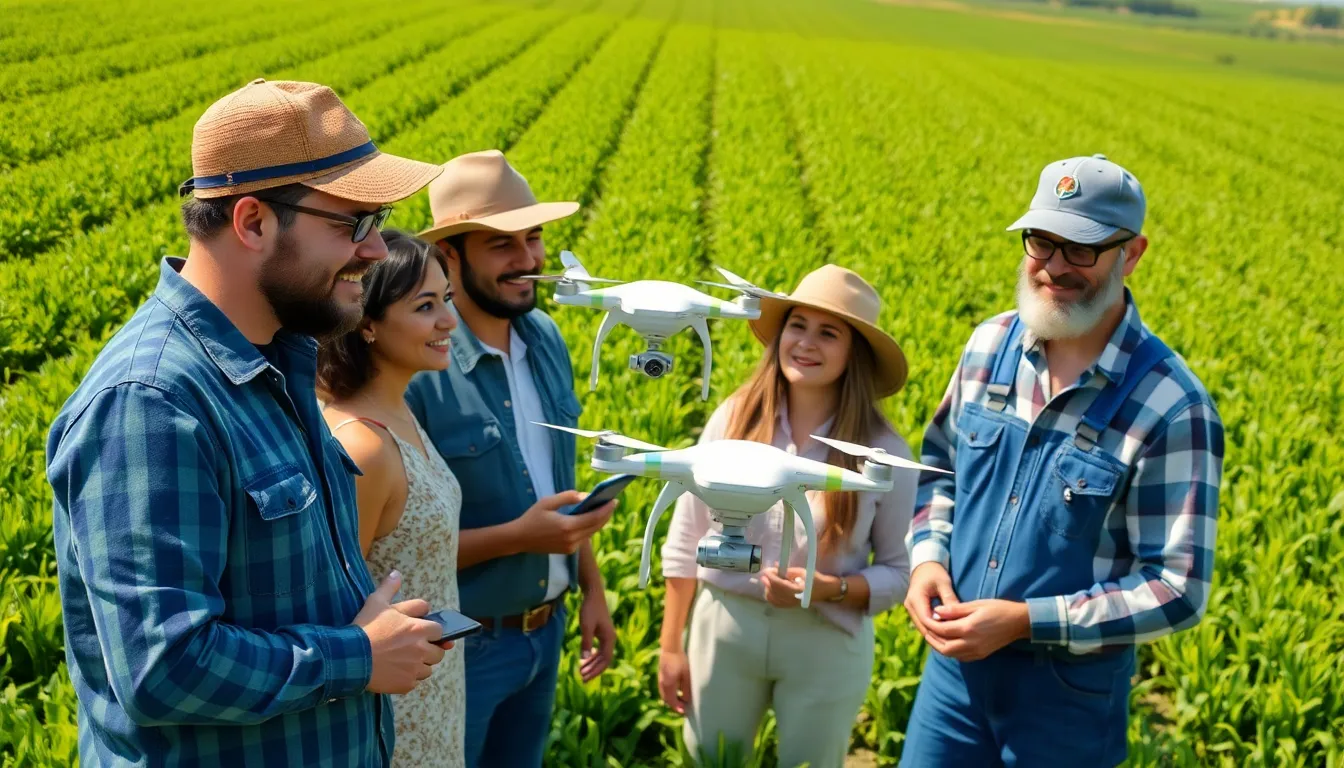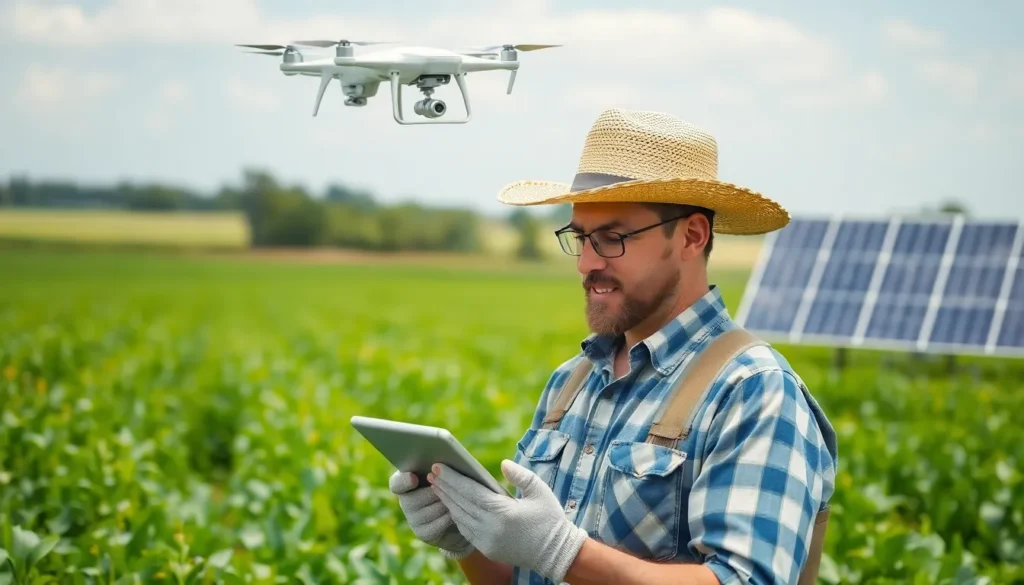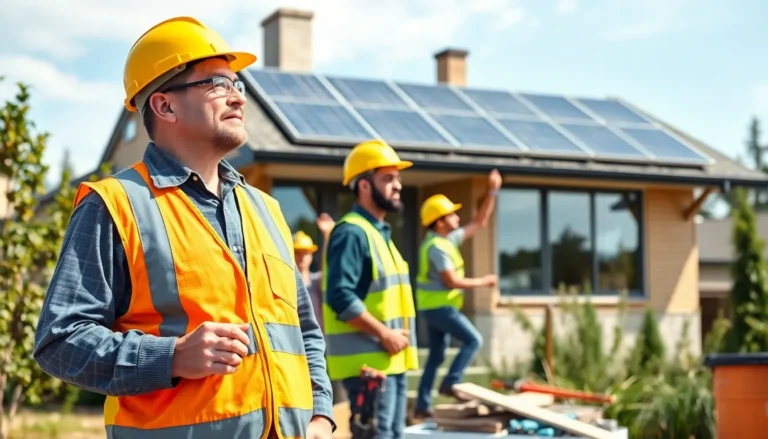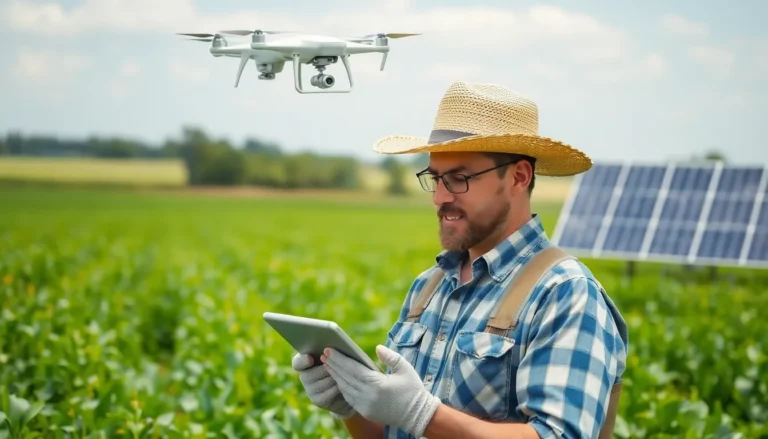Table of Contents
ToggleIn a world where the avocado toast craze has taken over brunch menus, sustainable farming technology is the unsung hero quietly saving the planet. Imagine a future where robots tend to crops, drones monitor soil health, and farmers are equipped with apps that make them feel like tech-savvy wizards. It’s not just farming; it’s farming with a futuristic twist that even sci-fi fans would applaud.
Sustainable farming technology isn’t just about saving the planet; it’s about making agriculture smarter, more efficient, and yes, a bit cooler. From precision agriculture to vertical farms, these innovations promise to transform how food is grown, ensuring that future generations can enjoy their kale smoothies guilt-free. So buckle up and get ready to explore how these game-changing technologies are revolutionizing the fields while keeping Mother Earth happy and healthy.
Overview Of Sustainable Farming Technology
Sustainable farming technology encompasses various innovative practices and tools aimed at enhancing agricultural efficiency while minimizing environmental impact. Robotics plays a significant role, with automated systems handling tasks like planting, harvesting, and monitoring crops. Drones equipped with sensors provide real-time data on crop health and soil conditions, allowing farmers to make informed decisions.
Smart applications integrate with farm management systems, offering features like weather forecasting, pest detection, and crop rotation planning. These apps facilitate better resource allocation and proactive management strategies, leading to increased yields and reduced waste.
Precision agriculture stands out as a key component, utilizing data analytics to optimize input use. This approach helps in applying fertilizers and water only where necessary, significantly lowering costs and environmental harm.
Vertical farming represents another innovative method that maximizes land use. By growing crops in stacked layers, this technique reduces the need for expansive farmland while ensuring year-round production. Additionally, aquaponics combines fish farming with crop cultivation, creating a sustainable ecosystem that supports food production.
Integration of renewable energy sources, such as solar and wind, enhances the sustainability of farming operations. These energy solutions power equipment and facilities, reducing dependency on fossil fuels.
Overall, sustainable farming technology aims to balance productivity and environmental stewardship, ensuring agricultural practices are viable for future generations.
Key Benefits Of Sustainable Farming Technology

Sustainable farming technology brings numerous advantages, significantly impacting both the environment and the economy.
Environmental Impact
Sustainable farming technology reduces resource depletion by optimizing water and fertilizer usage. It enhances biodiversity through practices that promote natural ecosystems. Technologies like precision agriculture lead to lower emissions and less chemical runoff, preserving soil health. Drones and sensors monitor crop health in real-time, allowing for timely interventions that minimize environmental harm. Improved waste management systems further contribute to sustainable practices, ensuring agriculture aligns more closely with ecological health. Such advancements promise cleaner air and water, benefiting surrounding ecosystems.
Economic Advantages
Economic benefits emerge via increased efficiency and reduced operational costs. Automation, through robotics, decreases labor expenses while increasing productivity. Sustainable practices often lead to higher crop yields due to better resource management. Access to data analytics helps farmers make informed decisions, driving profitability. Market demand for sustainably sourced products is growing, allowing farmers to command premium prices. Additional incentives, like grants for renewable energy adoption, can lower initial costs for farmers. Overall, embracing sustainable farming technology offers financial resilience amid fluctuating market conditions.
Innovative Technologies In Sustainable Farming
Innovative technologies transform sustainable farming practices, enhancing efficiency and minimizing environmental impact. These advancements support a holistic approach to agriculture that addresses modern challenges.
Precision Agriculture
Precision agriculture leverages data analytics to fine-tune farming practices. Farmers collect real-time data from sensors to monitor soil health and crop conditions. Using this information, they optimize inputs like water and fertilizer, reducing waste and enhancing yields. Integrating GPS technology enables targeted application of resources, ultimately driving down costs. Agricultural drones provide aerial imagery, allowing farmers to assess crop health visually. Farmers relying on this data can respond quickly to any issues that arise, improving overall productivity.
Renewable Energy Solutions
Renewable energy solutions play a vital role in sustainable farming operations. Solar panels and wind turbines provide clean energy to power equipment and facilities. Farmers who adopt these solutions often experience significant cost savings on energy bills. By generating their own energy, they reduce reliance on fossil fuels, lowering greenhouse gas emissions. Biomass energy also offers potential, allowing farmers to convert waste into usable energy. Implementing these technologies results in a more sustainable agricultural model that meets both environmental and economic goals.
Challenges And Considerations
Sustainable farming technology faces several challenges and considerations affecting its adoption. Addressing these issues is crucial for maximizing the benefits of innovative practices.
Initial Investment Costs
Initial investment costs pose a significant barrier for many farmers. Equipment like drones and automated systems often comes with a steep price tag, making it challenging for smaller operations to adopt. These upfront expenses, while potentially offset by long-term savings, require careful financial planning. Some farmers may explore grants and subsidies aimed at promoting sustainable practices to mitigate these costs. Researching financing options helps them make informed choices about technology investments.
Adapting Traditional Practices
Adapting traditional practices presents another challenge in sustainable farming technology. Many farmers rely on time-honored methods they trust. Integrating new technologies requires a shift in mindset and operational adjustments. Training becomes essential for ensuring farmers can effectively utilize advanced tools. Bridging the gap between innovation and established techniques fosters a smoother transition to more sustainable practices. Successful adaptation often hinges on community support and shared knowledge among farmers to build confidence in these emerging technologies.
Future Trends In Sustainable Farming Technology
Emerging technologies will redefine sustainable farming practices, enhancing efficiency and environmental stewardship. Robots designed for agricultural tasks increase productivity and reduce labor needs, allowing farmers to focus on strategic decisions. Drones equipped with advanced imaging capabilities are set to revolutionize crop monitoring, offering detailed insights for precise interventions.
Data analytics will play a crucial role in the optimization of farming operations. By utilizing big data, farmers can predict crop yields more accurately, leading to better planning and resource allocation. Moreover, Internet of Things (IoT) devices will facilitate real-time monitoring of environmental conditions, ensuring optimal growth conditions for crops.
As vertical farming gains popularity, urban agriculture will expand significantly. Using controlled environments, it allows for year-round production while minimizing space usage. Aquaponic systems, which combine aquaculture and hydroponics, will attract more attention, creating a self-sustaining ecosystem that utilizes fish waste as fertilizer.
Renewable energy integration into farming will accelerate, with solar panels and wind turbines powering operations sustainably. Many farms will adopt energy-efficient practices, decreasing reliance on fossil fuels and further reducing carbon footprints. Biomass energy and waste-to-energy systems will also become standard as farmers look to enhance sustainability.
Additionally, consumer demand for transparency and sustainability in food production will influence farmers’ practices. Farmers increasingly adopt sensors and apps that provide traceability in their supply chains. As these technologies become more accessible, they empower consumers to make informed choices about sustainable sourcing.
Overall, these advancements signal a shift towards smarter, eco-friendly farming practices that balance productivity with environmental health. The agricultural landscape stands poised for transformation as these trends unfold, ensuring sustainability remains at the forefront of food production.
Sustainable farming technology is reshaping the agricultural landscape by merging innovation with environmental stewardship. As farmers embrace advanced tools like drones and smart applications, they’re not only enhancing productivity but also contributing to a healthier planet. The integration of renewable energy solutions further solidifies this commitment to sustainability.
Future trends promise even greater advancements, with robotics and data analytics poised to redefine farming practices. This evolution will ensure that agriculture remains viable and efficient, catering to the demands of a growing population while preserving natural resources. By adopting these technologies, farmers can secure a sustainable future for generations to come.







